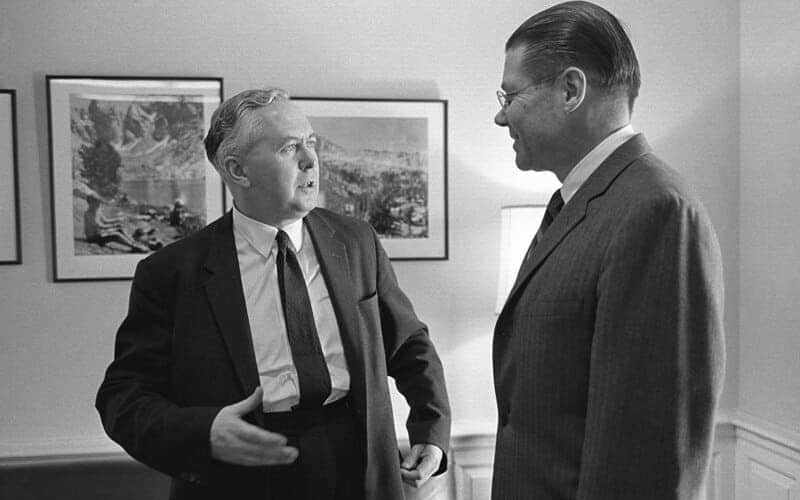Robert McNamara was born on June 9, 1916, and he died on July 6, 2009. Robert McNamara was a government official who served as the eighth United States Secretary of Defense from 1961 to 1968, under Presidents John F. Kennedy and Lyndon B. Johnson, during the height of the Cold War. Robert McNamara was responsible, among many other things, for the institution of systems analysis in public policy, which developed into the discipline known today as policy analysis, as explained in the book “How Much Is Enough?” Robert McNamara has a complicated legacy that includes the Vietnam War. Do you think Robert McNamara was good for America?

Robert McNamara Biography
Robert McNamara was well educated and was a member of the ‘Whiz Kids’ at the Ford Motor Company. The Whiz Kids helped the money-losing Ford company reform its poor administration through modern planning, organization, and management control systems. That presaged Robert McNamara’s time as the Secretary of Defense. President-elect John F. Kennedy first offered the position of Secretary of Defense to Robert A. Lovett, who had already served in that position in the Truman administration; Lovett declined but recommended Robert McNamara. Kennedy had read about McNamara and his career in a Time magazine article on December 2, 1960. He interviewed McNamara and hired him.
McNamara became a close adviser to President John F. Kennedy and advocated the use of a blockade during the Cuban Missile Crisis. McNamara oversaw the buildup of United States soldiers in South Vietnam. After the 1964 Gulf of Tonkin incident, the number of soldiers in Vietnam increased. Robert McNamara and other U.S. leaders feared that the fall of South Vietnam to a Communist regime would lead to the fall of different governments in the region.
He grew skeptical of the efficacy of committing American troops to South Vietnam. In 1968, he resigned as Secretary of Defense to become president of the World Bank. He served as the president of the World Bank from 1971 to 1981. After retiring, he served as a trustee of several organizations, including the California Institute of Technology and the Brookings Institution. In later writings and interviews, including his memoir, Robert McNamara expressed regret for some of the decisions he made during the Vietnam War.
McNamara’s Role in the Kennedy Administration
McNamara was a key member of the Kennedy Administration and participated in many of the Administration’s decisions. One of the essential tools used by McNamara was ‘systems analysis.” Two of the systems analysis’s foremost practitioners during the era were Alain C. Enthoven and K. Wayne Smith, who wrote the book How Much Is Enough?
They described systems analysis like this, “First, the word ‘systems’ indicates that every decision should be considered in as broad a context as necessary… The word ‘analysis’ emphasizes the need to break down a complex problem into its constituent parts for better understanding. Systems analysis takes a complex problem and sorts out the tangle of significant factors so that each can be studied by the method most appropriate to it.”
Robert McNamara became one of the few members of the administration who socialized with Kennedy, and he also grew close to Attorney General Robert F. Kennedy. He eventually served as a pallbearer at Kennedy’s funeral in 1968. Robert McNamara left office on February 29, 1968; the President awarded him both the Medal of Freedom. McNamara then became President of the World Bank. During his 13 years there, he introduced key changes, including shifting the Bank’s economic development policies toward targeted poverty reduction.
The Fog of War: Eleven Lessons from the Life of Robert S. McNamara is a 2003 documentary directed by Errol Morris, which primarily features interviews with Robert McNamara and archival footage. It went on to win the Academy Award for Documentary Feature. Robert McNamara died at his home in Washington, D.C., at 5:30 am on July 6, 2009, at the age of 93. He is buried at the Arlington National Cemetery in Arlington County, Virginia, with the grave marker also commemorating his wives. McNamara’s papers from his years as Secretary of Defense are housed in the John F. Kennedy Presidential Library and Museum in Boston, Massachusetts.
Conclusion
Robert McNamara was one of the greatest American thinkers in history. We are lucky, as a nation, that he served as Secretary of Defense, and we are equally lucky that he wrote an autobiography and filmed a documentary about his life. That he served as President of the World Bank after his tenure as the Secretary of Defense is incredible.








